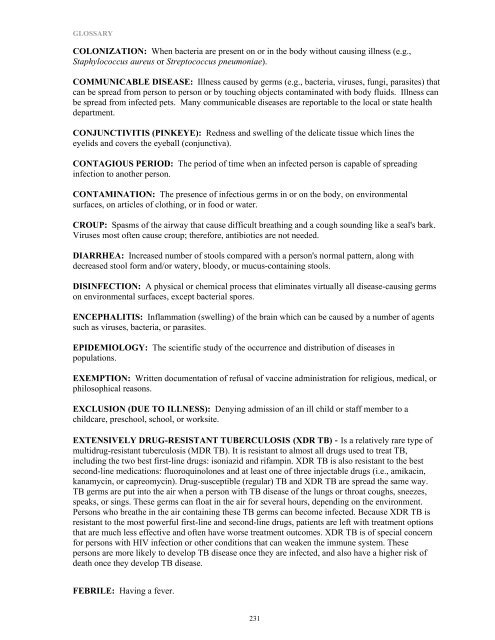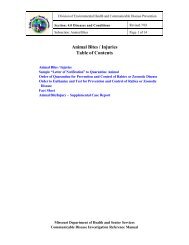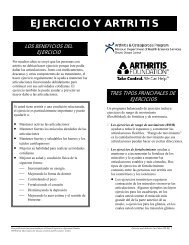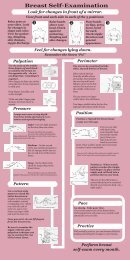Prevention and Control of Communicable Diseases - Missouri ...
Prevention and Control of Communicable Diseases - Missouri ...
Prevention and Control of Communicable Diseases - Missouri ...
Create successful ePaper yourself
Turn your PDF publications into a flip-book with our unique Google optimized e-Paper software.
GLOSSARY<br />
COLONIZATION: When bacteria are present on or in the body without causing illness (e.g.,<br />
Staphylococcus aureus or Streptococcus pneumoniae).<br />
COMMUNICABLE DISEASE: Illness caused by germs (e.g., bacteria, viruses, fungi, parasites) that<br />
can be spread from person to person or by touching objects contaminated with body fluids. Illness can<br />
be spread from infected pets. Many communicable diseases are reportable to the local or state health<br />
department.<br />
CONJUNCTIVITIS (PINKEYE): Redness <strong>and</strong> swelling <strong>of</strong> the delicate tissue which lines the<br />
eyelids <strong>and</strong> covers the eyeball (conjunctiva).<br />
CONTAGIOUS PERIOD: The period <strong>of</strong> time when an infected person is capable <strong>of</strong> spreading<br />
infection to another person.<br />
CONTAMINATION: The presence <strong>of</strong> infectious germs in or on the body, on environmental<br />
surfaces, on articles <strong>of</strong> clothing, or in food or water.<br />
CROUP: Spasms <strong>of</strong> the airway that cause difficult breathing <strong>and</strong> a cough sounding like a seal's bark.<br />
Viruses most <strong>of</strong>ten cause croup; therefore, antibiotics are not needed.<br />
DIARRHEA: Increased number <strong>of</strong> stools compared with a person's normal pattern, along with<br />
decreased stool form <strong>and</strong>/or watery, bloody, or mucus-containing stools.<br />
DISINFECTION: A physical or chemical process that eliminates virtually all disease-causing germs<br />
on environmental surfaces, except bacterial spores.<br />
ENCEPHALITIS: Inflammation (swelling) <strong>of</strong> the brain which can be caused by a number <strong>of</strong> agents<br />
such as viruses, bacteria, or parasites.<br />
EPIDEMIOLOGY: The scientific study <strong>of</strong> the occurrence <strong>and</strong> distribution <strong>of</strong> diseases in<br />
populations.<br />
EXEMPTION: Written documentation <strong>of</strong> refusal <strong>of</strong> vaccine administration for religious, medical, or<br />
philosophical reasons.<br />
EXCLUSION (DUE TO ILLNESS): Denying admission <strong>of</strong> an ill child or staff member to a<br />
childcare, preschool, school, or worksite.<br />
EXTENSIVELY DRUG-RESISTANT TUBERCULOSIS (XDR TB) - Is a relatively rare type <strong>of</strong><br />
multidrug-resistant tuberculosis (MDR TB). It is resistant to almost all drugs used to treat TB,<br />
including the two best first-line drugs: isoniazid <strong>and</strong> rifampin. XDR TB is also resistant to the best<br />
second-line medications: fluoroquinolones <strong>and</strong> at least one <strong>of</strong> three injectable drugs (i.e., amikacin,<br />
kanamycin, or capreomycin). Drug-susceptible (regular) TB <strong>and</strong> XDR TB are spread the same way.<br />
TB germs are put into the air when a person with TB disease <strong>of</strong> the lungs or throat coughs, sneezes,<br />
speaks, or sings. These germs can float in the air for several hours, depending on the environment.<br />
Persons who breathe in the air containing these TB germs can become infected. Because XDR TB is<br />
resistant to the most powerful first-line <strong>and</strong> second-line drugs, patients are left with treatment options<br />
that are much less effective <strong>and</strong> <strong>of</strong>ten have worse treatment outcomes. XDR TB is <strong>of</strong> special concern<br />
for persons with HIV infection or other conditions that can weaken the immune system. These<br />
persons are more likely to develop TB disease once they are infected, <strong>and</strong> also have a higher risk <strong>of</strong><br />
death once they develop TB disease.<br />
FEBRILE: Having a fever.<br />
231
















